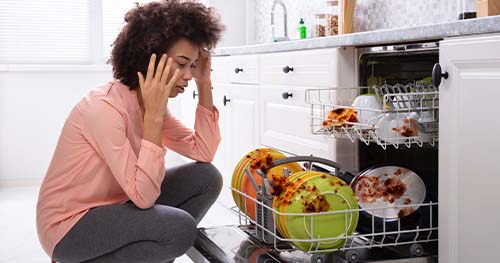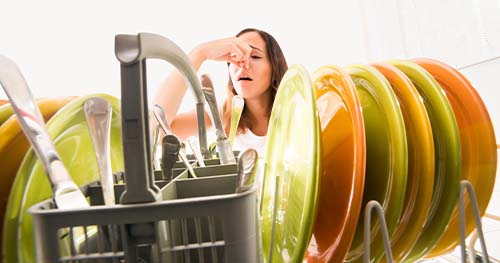
If you’re having problems, here are our tips to troubleshoot common dishwasher problems.
Dishes Aren’t Coming Out Clean
Dishwashers are the most popular home appliance in the United States. Approximately 56 percent of households have one. However, it’s not uncommon for dishes and utensils to come out of the dishwasher dirty.
- The wrong detergent. Detergent that is too strong or weak can leave soap scum on your dishes. Use a mild liquid detergent and check that it doesn’t contain chlorine bleach or phosphates. If you use powdered detergent, ensure it dissolves completely before starting the dishwasher cycle.
- Food particles are left behind. Food particles left on plates or flatware can cling together and stick to your dishes during washing, preventing them from getting clean. Add a rinse agent to help loosen food particles so they can be washed away by water pressure during rinsing cycles.
- Water temperature is too low or too high. Water temperature affects how well soap dissolves into sudsy bubbles that lift off food particles. Warm or hot water is best for this purpose because it speeds up the evaporation of excess water from soiled items.
Dishwasher Doesn’t Run
Dishwasher not running? It could be due to several issues.

If the door doesn’t close properly, water won’t enter the machine when you turn it on. To fix this problem, check that all parts are correctly installed and in good condition. For example, you may need to replace or repair a defective latch assembly.

Dishwasher Doesn’t Fill
If you have a dishwasher that won’t fill, the problem may be with the float arm or inlet valve. The float arm is a small metal rod that sticks up from the bottom of the dishwasher. When it fills with water, it signals to the dishwasher’s computer that there’s enough water in the tub to start filling. Unfortunately, if this piece is broken, there’s no way for the computer to know when there is enough water in the tub.
Dishwasher Doesn’t Drain
If your water doesn’t drain out of your dishwasher, something may have been caught in the drain pump screen or the impeller (the part that pumps water). First, remove any foreign objects from both locations by hand. If necessary, use a pair of needle-nose pliers for this task. Then try rerunning your dishwasher; if it drains now, you solved the problem.
Dishwasher Smells Bad
If your dishwasher smells bad, your dishes smell bad, which is someone no one wants to experience.
If possible, use liquid detergent in your dishwasher as it dissolves more easily than powder detergents. If you don’t have enough detergent in your machine, there won’t be enough suds to clean the dishes properly. They’ll come out smelly and dirty looking no matter how much you run them through the cycle again and again.



